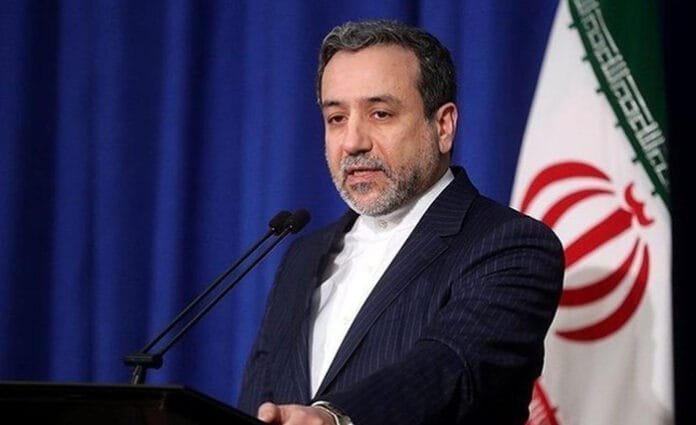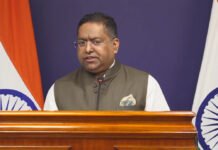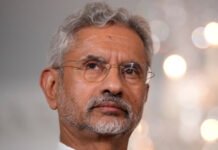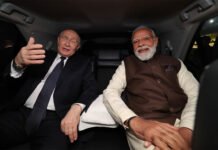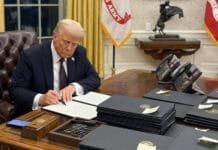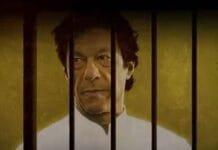INVC NEWS New Delhi — Iranian Foreign Minister Syed Abbas Araghchi has arrived in New Delhi for his maiden diplomatic visit to India at a time when tensions between India and Pakistan are sharply escalating. This high-profile visit centers around the 20th India-Iran Joint Commission Meeting, which Araghchi will co-chair with External Affairs Minister Dr. S. Jaishankar. The discussions are expected to focus on bilateral cooperation, regional stability, and strategic partnerships.
Bilateral Diplomacy Amid Terror Crisis in Jammu & Kashmir
The visit unfolds just days after a horrifying terror attack in Pahalgam, Jammu & Kashmir, where 26 civilians were selectively targeted and murdered by Pakistan-based terrorists. India responded with precise missile strikes on nine terror camps located in Pakistan and Pakistan-occupied Kashmir (PoK), marking a decisive escalation in defense posture.
Araghchi’s diplomatic arrival during this volatile period places Iran in a unique position as both a regional stakeholder and a potential peace broker, while simultaneously strengthening its strategic ties with India.
20th Joint Commission: Rebuilding Momentum in India-Iran Ties
Held after a prolonged gap due to the pandemic and shifting domestic priorities, the Joint Commission Meeting marks a revival of momentum in India-Iran bilateral relations. Both sides are set to review trade agreements, deepen collaboration across key sectors, and explore new areas of strategic and economic cooperation.
The meeting also coincides with the 75th anniversary of the India-Iran Treaty of Friendship, offering symbolic weight to this diplomatic engagement. Officials from both sides are expected to chart new frameworks for connectivity, commerce, energy cooperation, and counter-terrorism collaboration.
High-Level Talks and Ceremonial Engagements
Alongside co-chairing the Joint Commission, Araghchi is scheduled to meet President Droupadi Murmu at Rashtrapati Bhavan, following his strategic dialogue with Dr. S. Jaishankar. These high-level interactions underscore Iran’s intent to bolster its position as a reliable ally and regional influencer, especially as the Middle East-South Asia corridor gains global attention.
Iran Condemns Pahalgam Attack, Extends Support to India
Following the Pahalgam tragedy, Araghchi publicly condemned the attack, describing it as a “heinous act of terrorism against innocents.” Iran’s Ministry of Foreign Affairs issued a clear message of solidarity with the people and government of India, offering condolences to victims’ families and emphasizing Tehran’s zero tolerance for terrorism.
This stance marks a significant diplomatic alignment, positioning Iran firmly against the Pakistan-backed insurgency that continues to destabilize the Indian subcontinent.
Call for Restraint Amid Rising Military Tensions
While supporting India’s right to defend its sovereignty, Iran also called for restraint and dialogue between India and Pakistan. Araghchi urged both nuclear-armed neighbors to pursue diplomatic channels over direct confrontation, reaffirming Iran’s support for peaceful conflict resolution in South Asia.
This balanced but firm position reflects Tehran’s nuanced diplomacy—condemning violence without antagonizing Pakistan, while reinforcing its long-standing strategic rapport with India.
Strategic and Economic Collaboration in Focus
The Joint Commission Meeting will also cover a broad spectrum of economic issues, including:
Chabahar Port Development: Fast-tracking progress on this India-funded project, which holds the key to regional trade and bypassing Pakistan for access to Central Asia.
Energy Security and Oil Trade: Reopening discussions on resuming Iranian oil exports to India under alternative payment frameworks, especially as India diversifies its energy basket.
Trade Facilitation: Updating protocols on banking access, customs cooperation, and local currency settlements to revive pre-sanction economic activity.
Pharmaceutical and Tech Cooperation: Exploring joint ventures in healthcare, agriculture, fintech, and space technologies.
India is also expected to push for increased Iranian participation in regional economic platforms such as the International North-South Transport Corridor (INSTC).
Regional Security Cooperation Beyond Borders
With security dynamics shifting rapidly, both India and Iran share common concerns over:
Terror networks operating across borders
Unrest in Afghanistan post-Taliban return
Militant movements across the Gulf and Arabian Sea
The rise of religious extremism and digital radicalization
Joint efforts to strengthen intelligence-sharing, cybersecurity infrastructure, and counter-terror frameworks are likely to be discussed, laying the foundation for future defense diplomacy.
India’s Counter-Terror Operations: A Strategic Signal
Following the massacre in Pahalgam, India’s retaliatory missile strikes have sent a message of zero tolerance toward cross-border terrorism. This firm stance, coupled with increasing international support, including that from Iran, underscores India’s growing diplomatic and military credibility on the global stage.
Iran’s vocal condemnation of the attacks further strengthens India’s position, suggesting shared moral ground against extremism and a readiness for collective regional response.
Elevating Indo-Iran Relations for a New Geopolitical Era
The 75-year-old relationship between India and Iran is evolving beyond cultural affinity into a strategic alliance for the 21st century. This visit, the first of its kind during such a tense regional standoff, represents a turning point in bilateral diplomacy.
India is keen on deepening this partnership not just for energy and trade, but also as a counterweight to Chinese and Pakistani influence in the region. Iran, under severe sanctions and seeking reliable allies, views India as a stable, democratic, and economically potent partner.

